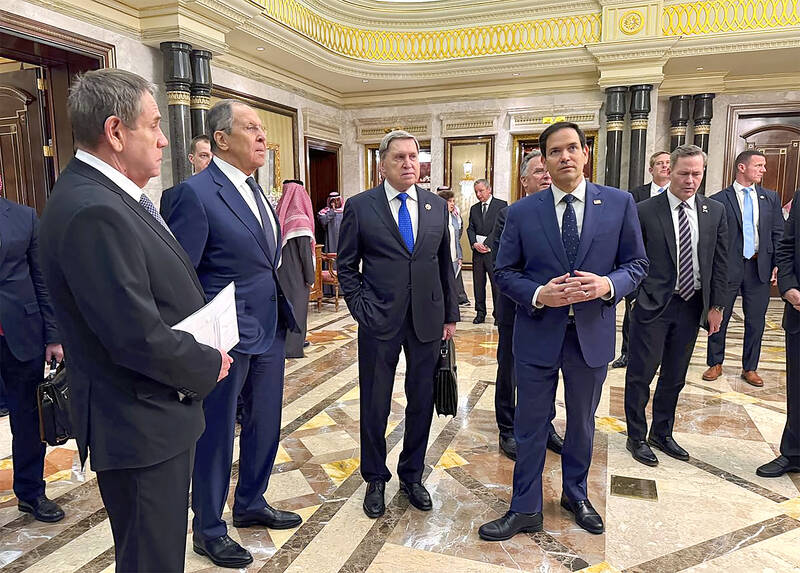Washington said Russia and the US would name teams to negotiate a path to ending the war in Ukraine as soon as possible, as the superpowers yesterday met in Saudi Arabia without Kyiv or the EU.
However, no specifics on a possible meeting between US President Donald Trump and his Russian counterpart, Vladimir Putin, emerged from the gathering in Riyadh, the first high-level official Washington-Moscow talks since the invasion of Ukraine in 2022.
Some European leaders, alarmed by Trump’s overhaul of US policy on Russia, fear Washington would make serious concessions to Moscow and rewrite the continent’s security arrangement in a Cold War-style deal between superpowers.

Photo: EPA-EFE
US Secretary of State Marco Rubio and Russian Minister of Foreign Affairs Sergei Lavrov agreed to “appoint respective high-level teams to begin working on a path to ending the conflict in Ukraine as soon as possible,” the state department said.
Washington said the two sides also agreed to “establish a consultation mechanism” to address “irritants” to Russia and the US’ relationship, adding that it would lay the groundwork for future cooperation.
“Today is the first step of a long and difficult journey but an important one,” Rubio said after the talks.
The US delegation said negotiations would include discussions about territory and security guarantees for Ukraine. Russia controls about one-fifth of Ukraine.
Rubio said Trump wants to move quickly to try to bring an end to the war, and that the goal is a fair, enduring and sustainable agreement.
The goal is an agreement that is “acceptable to everyone involved in it, and that obviously includes Ukraine, but also our partners in Europe, and, of course, the Russian side as well,” he added.
Russia offered less detail on the outcome of the talks, saying: “We discussed and outlined our principled positions, and agreed that separate teams of negotiators will be in touch on this topic in due course.”
“It is still difficult to talk about a specific date for a meeting between the two leaders,” said Yuri Ushakov, Putin’s foreign policy aide.
Russia sketched out some of its perspectives on future talks to ending the fighting in Ukraine, saying that settling the war required a reorganization of Europe’s defense agreements.
Moscow has long called for the withdrawal of NATO forces from eastern Europe, viewing the alliance as an existential threat on its flank.
“A lasting and long-term viable resolution is impossible without a comprehensive consideration of security issues on the continent,” Kremlin spokesman Dmitry Peskov told reporters in response to a question.
Before invading Ukraine in February 2022, Moscow had demanded NATO pull out of central and eastern Europe.
European leaders held an emergency meeting in Paris a day earlier, but struggled to put on a united front.
Ukrainian President Volodymyr Zelenskiy, in Turkey yesterday, said on the eve of the talks that he was not invited and would not “recognize any things or any agreements about us without us.”

A car bomb killed a senior Russian general in southern Moscow yesterday morning, the latest high-profile army figure to be blown up in a blast that came just hours after Russian and Ukrainian delegates held separate talks in Miami on a plan to end the war. Kyiv has not commented on the incident, but Russian investigators said they were probing whether the blast was “linked” to “Ukrainian special forces.” The attack was similar to other assassinations of generals and pro-war figures that have either been claimed, or are widely believed to have been orchestrated, by Ukraine. Russian Lieutenant General Fanil Sarvarov, 56, head

SAFETY FIRST: Double the number of police were deployed at the Taipei Marathon, while other cities released plans to bolster public event safety Authorities across Taiwan have stepped up security measures ahead of Christmas and New Year events, following a knife and smoke bomb attack in Taipei on Friday that left four people dead and 11 injured. In a bid to prevent potential copycat incidents, police deployments have been expanded for large gatherings, transport hubs, and other crowded public spaces, according to official statements from police and city authorities. Taipei Mayor Chiang Wan-an (蔣萬安) said the city has “comprehensively raised security readiness” in crowded areas, increased police deployments with armed officers, and intensified patrols during weekends and nighttime hours. For large-scale events, security checkpoints and explosives

PUBLIC SAFETY: The premier said that security would be tightened in transport hubs, while President Lai commended the public for their bravery The government is to deploy more police, including rapid response units, in crowded public areas to ensure a swift response to any threats, President William Lai (賴清德) said yesterday after a knife attack killed three people and injured 11 in Taipei the previous day. Lai made the remarks following a briefing by the National Police Agency on the progress of the investigation, saying that the attack underscored the importance of cooperation in public security between the central and local governments. The attack unfolded in the early evening on Friday around Taipei Main Station’s M7 exit and later near the Taipei MRT’s Zhongshan

REBUFFED: In response to Chinese criticism over recent arms sales, Washington urged Beijing to engage in meaningful dialogue instead of threats and intimidation Washington’s long-term commitment to Taiwan would not change, the US Department of State said yesterday, urging Beijing to stop pressuring Taiwan and engage in meaningful bilateral dialogues. The remarks came in response to a backlash from Beijing about Washington’s latest approval of arms sales to Taiwan. The US Defense Security Cooperation Agency said in a statement on Wednesday that the Taipei Economic and Cultural Representative Office in the US has asked to purchase an arms package, including Tactical Mission Network Software; AH-1W helicopter spare and repair parts; M109A7 self-propelled howitzers; HIMARS long range precision strike systems; tube-launched, optically tracked, wire-guided missiles; Javelin